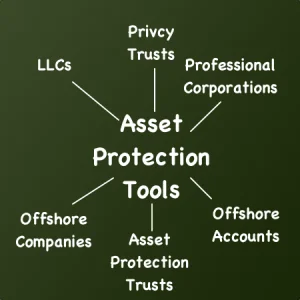As a successful medical doctor, you’re among the most educated and highest-earning professionals in the country. It took years of school, training, and residency to reach your station in life. Sadly, all the gains from your hard work can be stolen in an instant if left unprotected.
The healthcare industry is rife with financial threats. Every day, a doctor is sued by a patient, acquaintance, or aggressive contingency lawyer. In such a volatile landscape, asset protection plans aren’t a luxury—they’re a necessity.
When it comes to asset protection for physicians and dentists, asset protections trusts are some of the most powerful tools to secure wealth. With asset protection trusts, we can go two ways. First, we can set up a domestic trust, which is subject to U.S. court orders. Alternatively, we can choose an offshore trust, the asset protection gold standard, which is beyond their reach. Examining the case law history will bear this out. More on this later.
Read on as we explore the world of asset protection for medical professionals:
- Why Do Doctors Need Asset Protection?
- What is an Asset Protection Trust?
- Domestic and Offshore Asset Protection Trusts
- Why Offshore Asset Protection Trusts are Superior to Domestic Trusts
- What Can Doctors Protect Using an Offshore Asset Protection Trust?
- How Can a Doctor Set Up an Asset Protection Trust?

Why Do Doctors Need Asset Protection?
Doctors interact with people in extremely sensitive situations, and even the slightest error can open the door to a lawsuit.
Oftentimes, professional malpractice awards soar into the millions, far beyond the average doctor’s malpractice insurance coverage. This means your estate and other accumulated assets are at constant risk, even if you have a robust insurance policy.
Unfortunately, malpractice lawsuits aren’t the only financial risks doctors face. Here are a few other serious threats medical professionals should consider:
- Malpractice claims: Even if you’re the best doctor in the world, there’s a chance that you might be sued for malpractice. Whether it’s a misdiagnosis, a surgery complication, or a medication error, medical malpractice claims are incredibly common in the healthcare field, especially for OB/GYNs. And these claims often come with hefty price tags.
- Personal injury lawsuits: Doctors are often sued in personal injury cases because people assume they’re wealthy. If a patient or their family decides to sue you for an injury, your assets are on the line.
- Divorce: No one wants to think about divorce, but it’s a serious threat to your wealth. High-net-worth individuals, including doctors, are prime targets for divorce settlements. This threat is particularly pressing, as it impacts all doctors equally. You don’t have to work in a high-risk field like surgery or emergency medicine to face financial fallout from a divorce.
- Creditors: If you encounter any financial hardship, creditors may try to seize your personal assets to satisfy your debts. This threat is particularly pressing for medical professionals, who often take on significant student debt to pursue their careers. Doctors without a protection plan could find their assets tumbling into the hands of creditors.
The best way out of these increasingly common situations is to have a well-executed asset protection plan for physicians and other high-risk business owners. The right strategy can close gaps that insurance policies sometimes leave open.

What is an Asset Protection Trust?
Asset protection trusts are legal structures designed to keep your assets safe from creditors, lawsuits, and other threats. They do this by legally separating you from your assets and placing them under the watchful eye of a trustee. Because you are not the legal owner of the trust assets, when you get sued, the plaintiff cannot readily claim anything in the trust for damage compensation.
Trusts protect your wealth by providing all the following:
- Separation of asset ownership: To get started, transfer your assets into the trust. These could include investments, bank accounts, real estate, and even business interests. Additional legal strategies may apply for certain assets. Once the assets are inside the trust, they are no longer considered part of your personal estate. This makes them extremely difficult for creditors to seize.
- Trustee: A trustee, who is responsible for administering the trust according to the terms you’ve set, manages the trust. The trustee is usually an independent third-party organization licensed to act in this role.
- Creditor protection: Because the trust owns the assets and not you personally, the trust generally protects them from creditors. This means if a lawsuit is filed against you, creditors can’t come after the assets in the trust. Instead, they’re at the mercy of the trust’s terms. When established in the proper jurisdiction and properly drafted, these trusts are structured to be virtually untouchable.

Domestic and Offshore Asset Protection Trusts
As stated earlier, when you create an asset protection trust, you can do it at home or offshore. Domestic trusts are settled in your home country (the United States for this example). These trusts provide a decent level of asset protection but have a critical weakness when it comes to lawsuits – a domestic trustee must obey rulings from U.S. courts. Furthermore, the quality of a domestic trust varies significantly depending on the state of establishment.
Offshore asset protection trusts have few of the weaknesses of their domestic counterparts. These trusts are located outside of the United States, so trustees are not legally required to obey U.S. court orders. Additionally, these trusts are usually found in jurisdictions with remarkably favorable laws for trust creators. These same laws make it very difficult for any creditor to challenge the trust’s validity.

Why Offshore Asset Protection Trusts are Superior to Domestic Trusts
Although domestic asset protection trusts (DAPTs) offer some degree of protection, they’re not as secure or effective as offshore trusts.
Here’s why offshore asset protection trusts—particularly those in the Cook Islands, Belize, and Nevis —are superior:
- Stronger legal protection: Domestic asset protection trusts operate under the laws of the state of establishment. However, these laws can be overturned or challenged by courts in other states. On the other hand, offshore trusts are governed by the laws of the jurisdiction in which they are established, and many of these jurisdictions offer stronger protection against creditor claims.
- International jurisdictional protection: The Cook Islands, Belize, and Nevis are not subject to rulings from U.S. courts. If someone is suing you in the U.S., they cannot just walk into a local court and have your offshore trust invalidated. To challenge the trust, they’d have to initiate a complex, lengthy, and expensive legal battle in an offshore jurisdiction. The headache associated with this process is often enough to prevent creditors and plaintiffs from going after your assets.
- Confidentiality: Offshore trusts provide an additional layer of confidentiality. With a domestic trust, you may be required to disclose information in court if you’re sued. Offshore trusts typically have strict privacy laws, meaning your assets remain hidden from prying eyes. You also don’t have to worry about public disclosures in the event of a lawsuit.

What Can Doctors Protect Using an Asset Protection Trust?
One of the main reasons offshore asset protection trusts are so effective is their versatility. They can be used to protect a wide variety of assets, including cash, investment funds, and real estate. Combined, these three asset groups account for most of a doctor’s wealth, making these categories particularly important to safeguard.
An offshore asset protection trust will protect cash, investments, and real estate in the following ways:
- Cash: It’s easy to protect cash with an offshore trust. Your asset protection professional will create a bank account in a jurisdiction suitable to your needs. Then, the bank account will be placed directly into the trust, or preferably into an LLC that the trust owns. Now that the trust (or its LLC) holds that bank account, it’s essentially unattainable to creditors and lawyers.
- Investment funds: Protecting investment funds is vital for ensuring the passive growth of your wealth. Putting your investment fund into a trust will protect it and ensure it continues to grow.
- Real estate: Protecting real estate is a bit trickier than guarding currency-type assets, but it is still possible. Typically, an asset protection planner will keep your real estate safe by establishing an LLC that you own privately. Once established, you can have the LLC record home equity lines of credit (HELOCs) against any real estate you own. If you are sued, you can then have a trusted offshore institution buy that mortgage and place the proceeds into your offshore trust. Doing so protects your home and its value outside of your ownership, even if you live in it.
As you can see, an offshore asset protection trust can be used to protect almost anything. You can even set up trust-held LLCs and other business entities to further separate yourself from the assets you wish to protect.

How Can a Doctor Set Up an Asset Protection Trust?
Setting up effective asset protection for doctors is not a DIY project. Your opponent’s attorney will likely work overtime to try to poke holes in your asset protection structure. Therefore, any doctor who wants the highest level of asset defense must work closely with professionals. These should be professionals who regularly establish offshore trusts, to help ensure those holes don’t exist. If you work with a capable expert, the process will be surprisingly straightforward. Generally, setting up a trust looks something like this:
- Locate an asset protection expert: Look for someone with decades of experience establishing offshore trusts, such as Asset Protection Planners. Experts like these will customize your asset protection strategy to meet your unique needs as a medical professional. Furthermore, a good asset protection planner will execute each step of the trust establishment correctly, preventing legal issues down the road.
- Select a jurisdiction: Work with your planner to select the right jurisdiction. We suggest creating a Cook Islands Trust, Belize, or Nevis Trust, as those jurisdictions offer the strongest defenses for doctors.
- Set up bank accounts and business structures: If necessary, your asset protection team will help you set up bank accounts and corporate structures in the proper jurisdiction.
- Transfer your assets to the trust: With all the right accounts in place, it’s time to move your assets into the trust. Talk with your protection planner to ensure the transfers are done correctly.
- Select a trustee: Trust establishment experts typically have a network of reliable trustees in your offshore jurisdiction. It’s best to follow professional advice here, as most people are unaware of what makes a trustee reliable.
- Seek help for trust maintenance: Often, the same team that helped you establish the trust will help you maintain it. In response to annual legal changes, financial experts must re-analyze your trust structure. If there are any worrying changes, your trust creation team will make the necessary adjustments.
By following these steps, you can build a robust set of defenses for your wealth. Even if you decide to leave the medical field or retire, your offshore trust will protect you from other threats like divorce and lawsuits.

Turn to Asset Protection Planners for Help Setting Up Your Trust
As a doctor, you’ve worked incredibly hard to build your wealth. It’s unfair that someone could swoop in and take your assets out of the blue. Luckily, you now know how to defend your wealth using an offshore asset protection trust.
At Asset Protection Planners, we’ve spent decades developing asset protection strategies for doctors, dentists, and other medical professionals. Call us today to keep your assets safe!



